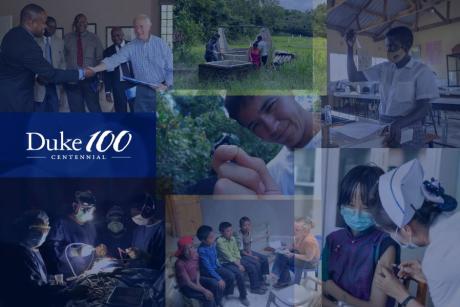
Neeraja Penumetcha (left) and colleague Katherine Arnold, senior humanitarian associate at the Global Alliance for Clean Cookstoves, discuss the efficient biomass-fueled cookstove models in the background.
Published September 6, 2016 under Alumni Stories
Neeraja Penumetcha, a 2012 graduate of the Master of Science in Global Health (MSc-GH) program at the Duke Global Health Institute (DGHI) has been building her career at the intersection of global health and engineering.
The self-described “global health engineer” from Grapevine, Texas, received a bachelor’s degree in electrical engineering from the University of Texas at Austin. “I am deeply interested in the role of engineering in international health and development,” said Penumetcha. “I studied engineering in college, but initially only connected with the subject on an academic level.” It was only after she learned about applications of engineering, especially in healthcare, that engineering became more tangible and interesting to her.
Penumetcha Was Attracted to DGHI’s Flexible Curriculum
DGHI’s flexibility in coursework was one of the most attractive aspects of the MSc-GH curriculum to Penumetcha, as it allowed her to explore the interdisciplinary nature of global health. She took courses in the Sanford School of Public Policy, the Duke Law School, and the foreign language department, and she conducted her research in collaboration with the Pratt School of Engineering alongside global health and engineering professor Robert Malkin.
Research on “Plan B” When Technology Fails
Penumetcha’s research project at DGHI explored how a biomedical equipment technician training program could affect health outcomes in Rwanda. Her work gathered information on the clinical “Plan B” that would be followed if an essential piece of medical equipment was out of service when it was needed for patient care, and how the back-up plans affected patient outcomes. “Through my thesis project, I developed an understanding of health technology assessment methodologies, health systems and policies, and clinical guidelines—and, more importantly, how all of those factors serve the ultimate goal of improving health,” she said.
Defining the Global Health Engineering Career
Since her graduation in 2012, Penumetcha has continued to build her career in global health while maintaining her interest and skills in engineering. She worked as a program manager at BIO Ventures for Global Health in Seattle, using her research and product development skills by combining pharmaceuticals and biotechnology in the fusion of global health and technology.
She now works as a senior associate for testing and technology with the Global Alliance for Clean Cookstoves with priority countries including Guatemala, Uganda and India. The Alliance is a public-private partnership that is creating a thriving market for clean and efficient cookstoves and fuels to save lives, improve livelihoods and protect the environment. Her role is focused on understanding and improving the state of technology with the goal of building global technical capacity.
In this role, and in her prior global health work, Penumetcha has been thankful for the ever-changing landscape of this field. “On a near-daily basis, I am excited by a new discovery, or new idea or new pilot program in international health or development. It's an expanding and evolving field,” she said. “Regardless of background or interests, there is a space for more people to engage in global health and development.”


